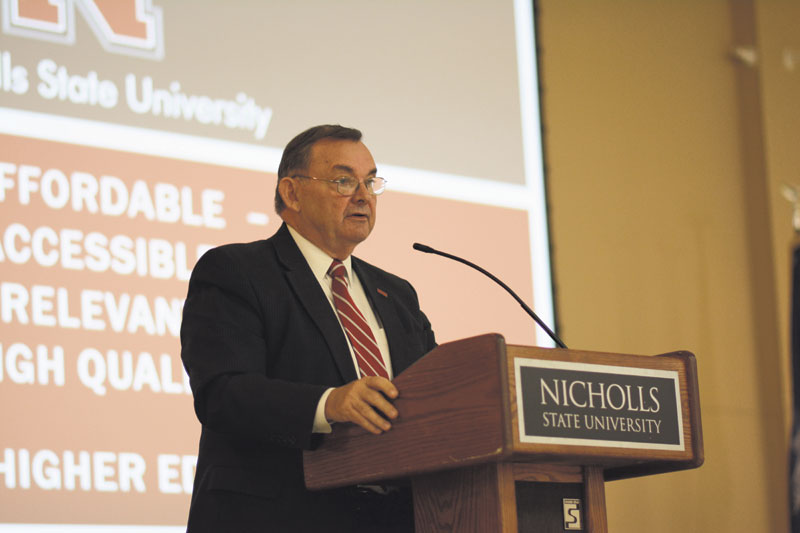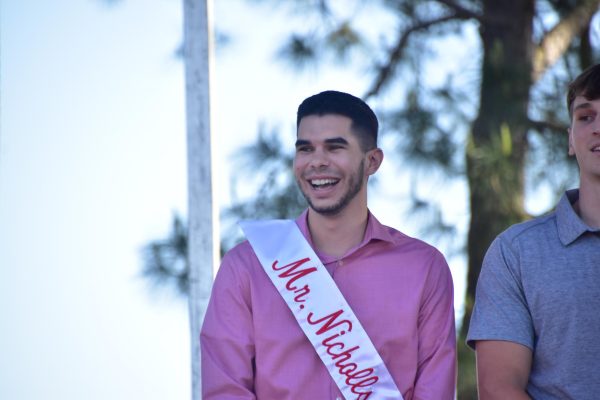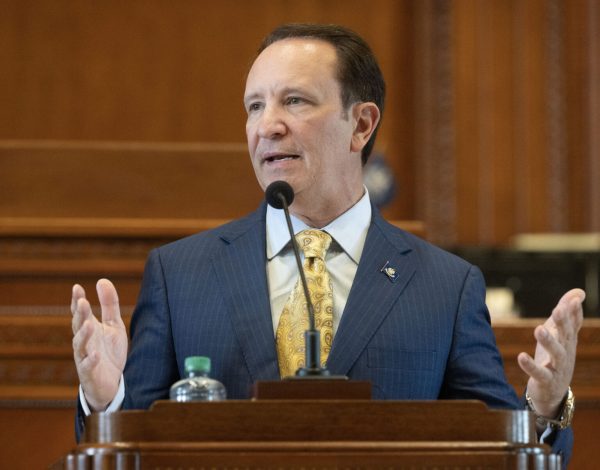University introduces presentation amid budget speculation
Photo by: Jeffery Miller
Dr. Bruce Murphy addressing the faculty and staff of Nicholls State University at a Faculty Institute update.
Nicholls State University introduced the message that it will present to decision makers and community leaders amid looming cuts to state funding in a pair of town hall meetings over the past week.
University President Bruce Murphy outlined the challenges that the University will face in the coming months, as well as the goals and ideas the University will use to cope with any possible cuts to the budget. However, Murphy stressed that the challenges facing the higher education system in Louisiana is about more than just saving Nicholls, but higher education in the state as a whole.
“There’s fantastic work being done here. That’s our message. There’s no ‘Here’s the package to go forward with.’ I think that other schools have had a different approach. You’ve probably seen about some of those. Some have talked about ‘ You have to save our school.’ I don’t think this should be about saving Nicholls. This should be about saving higher education within our state because any cut is going to mean fewer students,” Murphy said.
Governor Bobby Jindal is due to submit the state’s budget for the upcoming fiscal year, which is expected to include up to a $400 million cut to higher education to make up for a $1.6 million budget shortfall. If these cuts are as reported, the state’s cut to higher education during Jindal’s administration will rise over $1 billion.
The state’s appropriation to Nicholls’s budget has fallen from 63 percent in 2007-08 when the first budget cuts began to 32 percent in 2013-14. Currently, the University operates on a $55 million budget with $16 million of that coming from the state and the remainder coming from self-generated funds.
In previous years, the University raised tuition and fees to make up for the lack of state funding. However, Murphy said that the University is looking at ways to freeze tuition hikes, despite other university presidents asking for authority to raise tuition at various institutions around the state. Instead, Murphy is targeting an enrollment increase to 8,000, which would prove difficult with higher tuition and fees.
“However, to attract more students, Nicholls must also slow the increase in tuition and fees. Over the past five years, enrollment has decreased as costs have increased. I believe that’s called Economics 101. Some of my colleagues at other universities have called for authority to raise tuition and I have resisted that. I think that we have increased tuition enough on our students. I don’t see that as the answer to any of these situations,” Murphy said.
Murphy specifically pointed to high growth programs such as Petroleum Engineering Technology and Safety Measures (PETSM), Culinary and Maritime Management as well as an expansion of Nicholls Online as ways to meet the University’s goal of 8,000 students. The University is also looking recruit more out-of-state and international students to increase enrollment, along with other ideas.
“Nicholls is exploring several innovative ideas that would help stabilize student costs. Some of these include increasing retention and graduation rates and enhancing the student experience,” Murphy said.
“I encourage each of you to come up with additional ideas for growing enrollment, but these ideas are dependent on no further cuts to higher education.”
Beyond the high-growth programs, Vice President Neal Weaver of University Advancement, who spoke at Monday’s town hall meeting, and Murphy said the University must not only maintain the core programs of business, nursing, education and biology, which make up 46 percent of the University’s majors, but also provide programs that meet the workforce needs of the region.
“Beyond those bread and butter majors, this is exactly the type of behavior that the state and region needs from us. We have to continue to develop these programs and look for other ways to uniquely connect ourselves to the economy of this region because that’s where growth will come from,” Weaver said.
Murphy said he did not blame the current legislature or governor for the budgetary shortfall, which is affecting higher education, but State Rep. Jerome “Dee” Richard (I-Thibodaux) said that it is the legislators’ faults for not taking their jobs seriously enough to push the governor to not cut state funding to higher education.
“[Dr. Weaver] mentioned about the economy in Lafourche Parish and everything about that is true. Who’s looking out for us? If we don’t, nobody will. My point is, [Dr. Murphy] says the legislature is not at fault, the governor’s not at fault. We’re at fault. The legislature is at fault because we don’t take our job seriously. We had a bill that passed unanimously, everyone voted for it, but we chose not to go back in session to override the veto,” Richard said.
The bill, House Bill 142 (HB-142), passed both the House and Senate last year with unanimous votes but was vetoed by Jindal. HB-142, introduced by Richard, would have provided for a 10 percent reduction of all state professional, personal and consulting service contracts. The bill further provided that the savings from the cuts be deposited into the Higher Education Financing Fund.
In Louisiana, a bill can become law if the legislature approves it by a two-thirds vote of each house.
“How many of you realize we have to vote by secret ballot to go back to override a veto? Some states have an automatic provision that if a bill passes by two-thirds vote and it’s vetoed, they automatically go back into session. We can fund higher education. I’m saying all that because the governor is allowed to do that because we allow him to do that. We don’t take our jobs seriously enough. The process works if you get involved. If you don’t get involved, you’re going to get lined out somewhere,” Richard said.
Weaver said that dwindling higher education funding is not a new phenomenon across the country and that the only difference between Louisiana’s cuts and cuts in other states is the time frame in which it was done. Weaver said the focus should be on ensuring funding is not cut to 25 percent or less, rather than on funding returning to previous levels.
Richard also disagreed with Weaver’s belief that funding to higher education in the state will never go back to the level that it was in 2007-08.
“We can’t take it for granted. We have a strong university. There’s no way we should be cut at all. I’m not going to sit by idly and watch. I’ve got bills to try to pass. We do not fund higher education in the state of Louisiana and that’s wrong. The 30 percent is wrong. Should it get back to 50 percent? It better get back to 50 percent. It should be 50 percent or more. We’re working on that. We can get the right governor to get us going, but the problem is we don’t do our jobs. We give the governor his power and he takes it,” Richard said.
The Louisiana State University system recently released a website, the LSU Budget Hub, which provides information on past cut impacts and possible scenario of the upcoming cuts. However, Murphy said that any information being released in based on speculation and LSU’s website and scenarios are due in part to the University’s status as the flagship university of the state.
“I think that what my colleague [LSU Chancellor Dr. F. King] Alexander did was probably very wise. What he did was say let’s take the worst case scenario, play that out and we’re in a position of strength as the flagship of this state and we can say these things so this is what it would be. I don’t think that F. King Alexander believes the cuts will be at the level that he is projecting. I think what he’s doing is saying if a category 7 hurricane hit New Orleans, it would probably hurt it. I think that’s what he’s saying,” Murphy said.
Murphy said the University will wait on the approved budget before making any changes in regards to potential cuts.
“The real budget, the reality that we have to deal with won’t be known until late April at the earliest. That’s what we’re dealing with. So it would be not only premature but also irresponsible to start talking about we’re going to cut this, we’re going to cut that. We will work our strategy map. We will work towards those things that we know will deliver high quality education to our students and continue to do that until the reality changes, and then we will work with whatever that new reality is,” Murphy said.
However, Weaver said that he is confident that Nicholls will not be closed due to any budget cuts because its importance to the region and the state’s economy.
“I’m going to be a little pretentious. Nicholls isn’t going anywhere. We have 6,300 students. We are not a small institution. We have great quality all across the board. I’ve been blown away by the quality I’ve seen on this campus. Our area of the state is growing more than any other area of the state,” Weaver said. “The economy of this state is based in this region. I can make the case that there is no school more important to the future of the state of Louisiana than Nicholls State University. So, don’t think about whether we’re going to be saved. The question is how much are you going to invest in your future? Because if you’re going to, this is the place to do it.”











